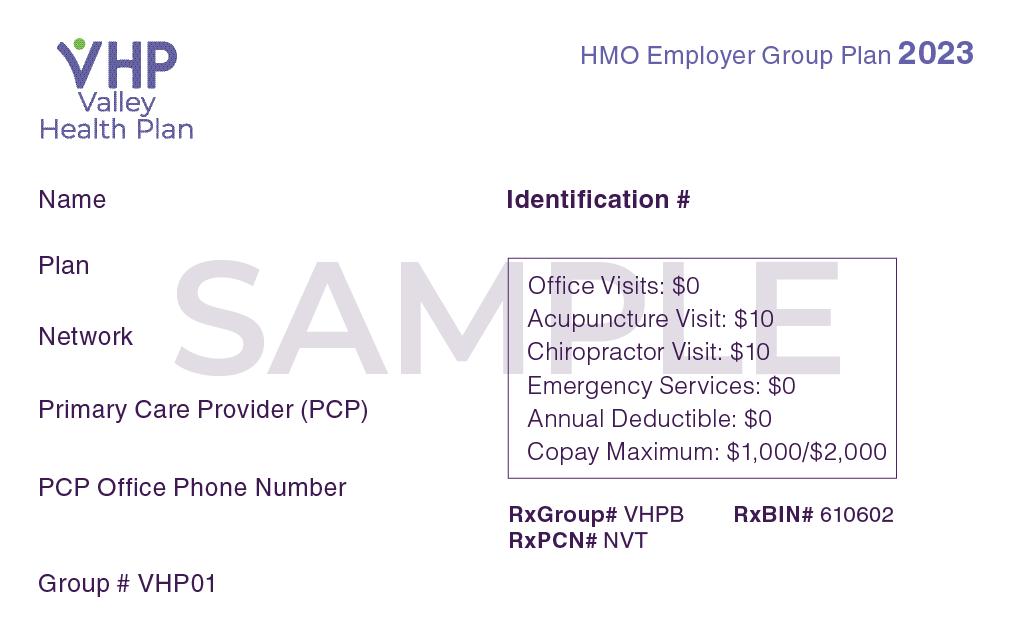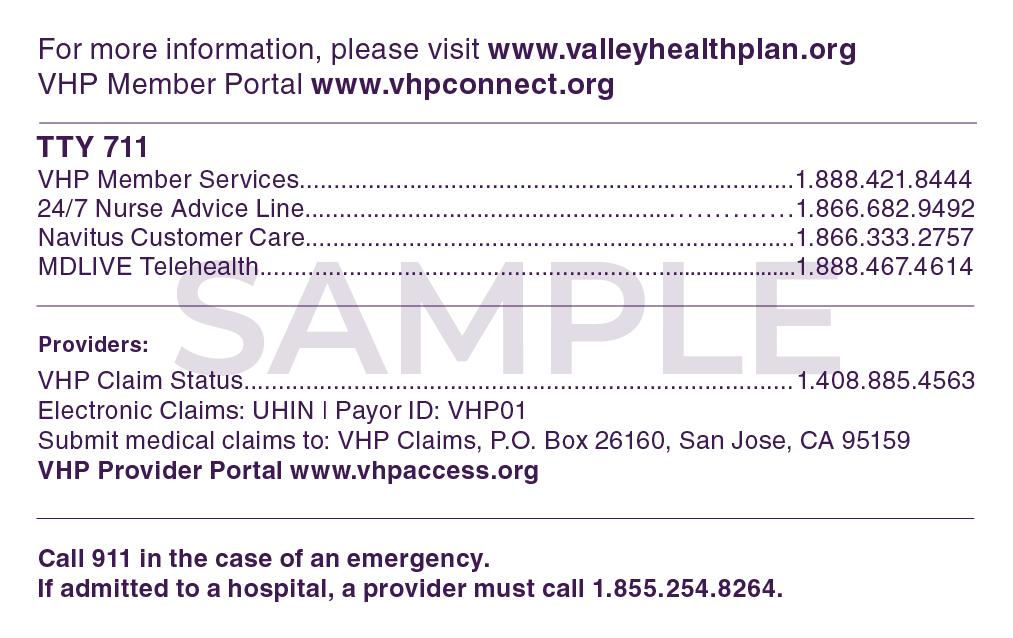
PROVIDER BULLETIN | SPRING 2023 VHP Access New Provider Portal Salinas Satellite Office Behavioral Health.................................................................................................................................... Pharmacy Medi-Cal Code Updates Health Equity Cancer Awareness New VHP Member ID Cards............................................................................................................ 2 6 4 10 3 7 5 12
VHP Access, the New Provider Portal, is Now Live!


On March 1, 2023, Valley Health Plan (VHP) launched VHP Access, a new online provider portal for referrals, authorizations, and eligibility. VHP Access replaced Valley Express, which was VHP’s previous referral/authorization system.
VHP Access is powered by Epic’s Tapestry software solution and was launched to help streamline processes, increase efficiency, and improve the provider experience.
VHP network providers can now complete the following actions in VHP Access:
• Submit prior authorization requests.
• Verify health coverage and benefits information.
• Submit and view claims and explanations of payment.
• View capitation payments and associated members.
• Receive status notifications regarding claims and authorizations.
• Review clinical documentation.
• Submit claims payment disputes.
• Submit referrals and view referral requests.
How to get a VHP Access user account
If you are a provider or work in a provider office and you need a user account for VHP Access, please visit www.vhpaccess.org. If you have questions or need assistance, please contact VHP Provider Relations at 408-885-2221 or providerrelations@vhp.sccgov.org.
VHP Access
PAGE 2
Salinas Satellite Office
On January 1, 2022, VHP began offering affordable health plan options to individuals and families living in Monterey and San Benito counties through the Covered California Health Exchange. With the expansion into Monterey and San Benito, VHP has now been selected by over 213,000 regional residents as their health plan of choice. VHP is committed to serving our neighbors with quality service, comprehensive health benefits, and competitively priced health care options.
To better serve our neighbors in Monterey and San Benito, we are pleased to share the news that VHP recently opened an office in Salinas, expanding access to services to support VHP’s Covered California members.


VHP’s provider network in Monterey and San Benito counties – anchored by premier institutions in the area – Hazel Hawkins Memorial Hospital, Natividad Medical Center, Salinas Valley Memorial Healthcare System and Community Hospital of the Monterey Peninsula - allows members access to a comprehensive network of providers, including primary care providers, specialists, clinics, urgent care, ambulatory surgery centers, and more.
If you have patients who need health care coverage and would like to connect with a representative to learn more about health coverage options, we welcome them to come by our new office, located at 917-A N. Main Street, Salinas, CA. Our office is open Monday – Friday, 9 a.m. – 6 p.m., except on holidays. They can also reach out to Member Services at 1-888-421-8444 or at memberservices@vhp.sccgov.org.
PAGE 3
Laura Rosas, CEO of VHP, accepts an award certificate from the Salinas Chamber of Commerce in recognition of the opening of the VHP Salinas Satellite Office on December 15, 2022.
Anthony Rocha, Salinas Councilmember, is pictured on the left, and Steve McShane, President and CEO of Salinas Chamber of Commerce, is on the right.
Behavioral Health
Help for Providers and Members: VHP Case Management
VHP case managers serve as patient advocates to support, guide, and coordinate care for patients, families, and caregivers as they navigate their health and wellness journeys. Case managers help to make health care easier and less stressful for our physicians and members.
Case managers can assist you and your patients by:
• Identifying contracted services, including behavioral health services
• Getting referrals and prior authorizations
• Supporting behavioral changes to increase treatment plan adherence
Our case managers may call our members directly if:
• They were recently released from the hospital and need help with follow-up visits to other doctors.
• They are going to the emergency room often for non-urgent care that could be handled by you, their health care provider.
• They or you, think case management might help the member.
• They call our 24/7 NurseLine and need follow-up for ongoing care.
• They have serious physical problems and need help managing their health.
• They have behavioral health problems and need help collaborating with their doctors.
If you have patients who may benefit from the assistance of a case manager, contact VHP Case Management at 669-220-5235 or vhpcasemgmt@vhp.sccgov.org.
Behavioral Health Prescribers: Share Information to Improve Care
Primary care providers (PCPs) are your allies in screening for complications from psychiatric medications. For example, PCPs routinely order labs for diabetes screenings, and hepatic and renal function. VHP encourages behavioral health prescribers to communicate the type and dosage of medications with PCPs.
Per a 2021 Pew Research Center survey, 52% of Americans would want their providers to share behavioral health or mental health history. Share to improve care!
To view the survey visit: Most Americans Want to Share and Access More Digital Health Data | The Pew Charitable Trusts (pewtrusts.org) .
Adverse Childhood Experiences (ACEs) Screening
Be a part of the effort to screen for Adverse Childhood Experiences (ACEs) and help treat the impact of toxic stress.
ACEs screenings are reimbursable only if the provider has been trained and certified to administer the screening.
For information on training visit: https://training.acesaware.org/aa/
PAGE 4
Diabetes Meter and Test Strips Change to OneTouch

VHP is now covering OneTouch brand diabetes meters and test strips for your patients with diabetes and will no longer cover Freestyle or Precision meters or test strips as of April 1, 2023. If you currently have patients using the Freestyle or Precision meters and test strips, we request that they bring their new prescriptions for OneTouch meters and test strips, along with their VHP ID cards to any plan pharmacy to obtain their new meters and test strips. If you have any questions, please contact OneTouch support at 1-800-524-7226 or VHP Provider Relations at 408-885-2221. For a list of VHP plan pharmacies visit: Pharmacy - Valley Health Plan.
Co-prescribe Naloxone to Patients
Receiving Chronic Opioid Prescriptions
VHP is committed to promoting opioid safety and lowering opioid related overdose deaths. Naloxone nasal spray and prefilled syringes are covered for VHP patients at no cost. VHP strongly encourages you to ensure that your VHP patients on chronic opioids are also co-prescribed naloxone.
New HIV Injectable Medications Are Covered by VHP
New long-acting injectable medications for HIV pre-exposure prophylaxis (PrEP) and for HIV treatment are now covered for your VHP patients.
Covered medications for HIV now include:
• HIV PrEP: Apretude (cabotegravir) is a limited distribution drug. VHP has access through AllianceRx Walgreens Pharmacy. The pharmacy can be reached at 1-888-347-3416 or by fax at 1-866-889-1510.
• HIV Treatment: Cabenuva (cabotegravir; rilpivirine)
Both injections are physician administered drugs and given intramuscularly every two months after the initial dose titration period.
U.S. Preventive Services Task Force Recommendation on Aspirin
For adults ages 40 to 59 years with an estimated 10% or greater 10-year cardiovascular risk, the decision to initiate low-dose aspirin use for the prevention of cardiovascular disease should be an individual one (Grade C: Offer or provide this service for selected patients depending on individual circumstances). Evidence indicates that the net benefit of aspirin use in this group is small. People who are not at increased risk for bleeding and are willing to take low-dose aspirin daily are more likely to benefit. For adults 60 years or older, do not initiate aspirin for the primary prevention of cardiovascular disease (Grade D: Discourage the use of this service).
Link to the U.S. Preventive Services Task Force Recommendation on Aspirin:
Recommendation: Aspirin Use to Prevent Cardiovascular Disease: Preventive Medication | United States Preventive Services Taskforce (uspreventiveservicestaskforce.org)
Pharmacy
PAGE 5
VHP Commercial Drug Formularies
The VHP Covered California and Individual & Family Plan Drug Formulary and the Employer Group Classic and Preferred Plans Formulary are reviewed quarterly and updated by the VHP Pharmacy and Therapeutics Committee. To view these formularies visit: https://www. valleyhealthplan.org/Pharmacy. Updates are posted monthly.
If you would like a printed copy of the VHP Drug Formulary, please contact Navitus Customer Care at 1-866-333-2757 or call VHP Provider Relations at 1-408-885-2221.

Navitus Health Solutions is VHP’s Pharmacy Benefits Manager and administers the pharmacy benefit on behalf of VHP, including the provision of customer service, formulary maintenance, prior authorizations, exception to coverage, and drug recall notifications. Navitus Customer Care is available 24 hours a day, 7 days a week, at 1-866-333-2757.
Medi-Cal Code Updates

Chiropractic Code Update
For dates of service on or after October 1, 2022, VHP no longer recognizes chiropractic manipulative treatment, CPT Code 98943, as a covered service for Medi-Cal members per page 27 of TAR and Non-Benefit List (ca.gov). This supersedes the information conveyed previously regarding this code in the July 2021 Provider Update and the Fall 2022 Provider Bulletin.
Note: CPT Code 98943 is still reimbursable for VHP’s Employer Group Classic and Preferred Plans.
Home Health and Hospice Code Update
For dates of service on or after November 1, 2022, VHP no longer recognizes skilled nursing service of a licensed practical nurse or registered nurse in the home health or hospice setting, Healthcare Common Procedure Coding System (HCPCS) code G0154, as a covered service for Medi-Cal members per item #4 of Medi-Cal Update - Home Health Agencies
Effective November 1, 2022, please bill skilled nursing service in a home health or hospice setting with HCPCS code G0299 for registered nurses or code G0300 for licensed vocational nurses and licensed practical nurses.
PAGE 6
Health Equity
Provider Survey –VHP Needs Your Help
VHP is pursuing the National Committee for Quality Assurance (NCQA) Health Equity Accreditation. The goals of the NCQA Health Equity Accreditation align with VHP’s mission to support the well-being of our members through a commitment to accessible, high-quality health services and community-focused, local care. Health Equity is a requirement of Covered California, California’s Health Benefits Exchange marketplace created by the Affordable Care Act, and is a priority for the Medi-Cal reform initiatives of the California Department of Health Care Services, California Advancing and Innovating Medi-Cal (CalAIM).
VHP’s commitment to health equity includes contracting with providers who can best serve the culturally and linguistically diverse populations who have chosen VHP as their health plan. You, our providers, are essential to our goal to ensure that care is rendered in an equitable manner.
VHP needs your help to gain NCQA Health Equity Accreditation. All contracted providers received a letter from VHP in December 2022, asking for participation in a survey to better understand demographics, language capabilities, and cultural competency. The data VHP receives from this survey will allow us to better understand the ethnic, cultural, and linguistic composition of our contracted network and to take the necessary steps to enhance the network to meet the needs of our membership. It will also allow VHP to better understand the support our providers may need to continue to provide culturally responsive healthcare services.
Please take a few minutes to respond to the survey by June 30, 2023. You can access the survey by clicking here: https://www. surveymonkey.com/r/VHPProviderSurvey
If you have questions about the survey, contact 408-885-2221 or providerrelations@vhp.sccgov.org.
VHP’s Language Assistance Program
VHP’s commitment to health equity extends to offering cultural and language resources to our contracted providers including:
• Starting in 2023 and annually thereafter, VHP will share reports with PCPs reflecting the language needs of members assigned to each practice.
• VHP is offering providers a language assistance resource called, “I Speak” cards, which are available to download from our website at: www.valleyhealthplan.org. “I Speak” cards were developed to help providers determine the language spoken by their patients, so an interpreter can be requested.
• Enhancements to VHP’s Language Assistance Program to ensure all contracted providers have access to in-person, video, or telephone interpretation services when needed.
• VHP has enriched the cultural and language resources available to contracted providers in our training materials and plans to offer indepth training annually. Training materials will also be shared with all new providers during Provider Orientation.
Language Assistance 24/7 to Providers, Free of Charge
VHP provides interpreter services for any covered service at no cost to members or providers. If you are contracted to care for VHP members you may use the VHP language line.
• Call VHP Language Services at 1-844-670-6820 or 1-850-633-4047.
• Select the language you need or press “0” for the operator.
• Provide the agent with your NPI number to be connected to an interpreter.
• For hearing impaired services, contact CA Relay Services Teletypewriters (TTY) at 711, then provide the following phone number 1-800-735-2929 (or for voice: 1-800-735-2922).
PAGE 7
Health Equity
• For in-person interpretations, please submit the request to VHP Language Services 72 hours in advance of when the interpretation is needed. To schedule an in-person interpretation, call 1-844-670-6820 or email memberservices@vhp.sccgov.org.
VHP understands that meeting the linguistic needs of members is a collaborative effort. To support and assist providers, VHP is sharing information about language use patterns in VHP’s service area and VHP’s current membership.
VHP currently serves Santa Clara, San Benito, and Monterey counties. The following table from census data indicates the language needs of the population within VHP’s service area.
Language English 281,154 71% 44,067 83% 1,377,694 80% 1,702,915 79% Spanish or Spanish Creole 103,580 26% 8,845 17% 133,346 8% 245,771 11% Vietnamese 1,303 0% 14 0% 72,359 4% 73,676 3% Tagalog 2,201 1% 87 0% 20,837 1% 23,125 1% Korean 1,176 0% 80 0% 11,481 1% 12,737 1% Chinese 851 0% 57 0% 67,808 4% 68,716 3% Japanese 627 0% 4 0% 6,866 0% 7,497 0% Persian 149 0% 7 0% 5,507 0% 5,663 0% Russian 205 0% 0 0% 5,285 0% 5,490 0% Hindi 145 0% 0 0% 4,935 0% 5,080 0% Portuguese or Portuguese Creole 220 0% 116 0% 3,197 0% 3,533 0% Mon-Khmer, Cambodian 157 0% 26 0% 2,142 0% 2,325 0% Arabic 685 0% 4 0% 1,418 0% 2,107 0% Gujarati 107 0% 0 0% 1,254 0% 1,361 0% French (incl. Patois, Cajun) 90 0% 0 0% 1,106 0% 1,196 0% Thai 111 0% 0 0% 1,073 0% 1,184 0% Urdu 35 0% 0 0% 1,067 0% 1,102 0% Italian 306 0% 27 0% 875 0% 1,208 0% German 170 0% 0 0% 854 0% 1,024 0% Serbo-Croatian 18 0% 0 0% 992 0% 1,010 0% Hebrew 8 0% 0 0% 587 0% 595 0% Laotian 0 0% 0 0% 458 0% 458 0% Greek 8 0% 0 0% 359 0% 367 0% Armenian 36 0% 0 0% 289 0% 325 0% Polish 4 0% 0 0% 286 0% 290 0% Hmong 94 0% 0 0% 156 0% 250 0% Monterey County San Benito County Santa Clara County Total Service Area
PAGE 8
Health Equity
The data below represents VHP’s membership by language as of 11/29/2022.
Santa Clara County
San Benito County Monterey County
Language English 281,154 71% 44,067 83% 1,377,694 80% 1,702,915 79% Spanish or Spanish Creole 103,580 26% 8,845 17% 133,346 8% 245,771 11% Vietnamese 1,303 0% 14 0% 72,359 4% 73,676 3% Tagalog 2,201 1% 87 0% 20,837 1% 23,125 1% Korean 1,176 0% 80 0% 11,481 1% 12,737 1% Chinese 851 0% 57 0% 67,808 4% 68,716 3% Japanese 627 0% 4 0% 6,866 0% 7,497 0% Persian 149 0% 7 0% 5,507 0% 5,663 0% Russian 205 0% 0 0% 5,285 0% 5,490 0% Hindi 145 0% 0 0% 4,935 0% 5,080 0% Portuguese or Portuguese Creole 220 0% 116 0% 3,197 0% 3,533 0% Mon-Khmer, Cambodian 157 0% 26 0% 2,142 0% 2,325 0% Arabic 685 0% 4 0% 1,418 0% 2,107 0% Gujarati 107 0% 0 0% 1,254 0% 1,361 0% French (incl. Patois, Cajun) 90 0% 0 0% 1,106 0% 1,196 0% Thai 111 0% 0 0% 1,073 0% 1,184 0% Urdu 35 0% 0 0% 1,067 0% 1,102 0% Italian 306 0% 27 0% 875 0% 1,208 0% German 170 0% 0 0% 854 0% 1,024 0% Serbo-Croatian 18 0% 0 0% 992 0% 1,010 0% Hebrew 8 0% 0 0% 587 0% 595 0% Laotian 0 0% 0 0% 458 0% 458 0% Greek 8 0% 0 0% 359 0% 367 0% Armenian 36 0% 0 0% 289 0% 325 0% Polish 4 0% 0 0% 286 0% 290 0% Hmong 94 0% 0 0% 156 0% 250 0% Hungarian 0 0% 0 0% 140 0% 140 0% French Creole 0 0% 0 0% 6 0% 6 0% Monterey County San Benito County Santa Clara County Total Service Area Urdu 1,067 1,102 Italian 306 0% 27 0% 875 0% 1,208 0% German 170 0% 0 0% 854 0% 1,024 0% Serbo-Croatian 18 0% 0 0% 992 0% 1,010 0% Hebrew 8 0% 0 0% 587 0% 595 0% Laotian 0 0% 0 0% 458 0% 458 0% Greek 8 0% 0 0% 359 0% 367 0% Armenian 36 0% 0 0% 289 0% 325 0% Polish 4 0% 0 0% 286 0% 290 0% Hmong 94 0% 0 0% 156 0% 250 0% Hungarian 0 0% 0 0% 140 0% 140 0% French Creole 0 0% 0 0% 6 0% 6 0%
PAGE 9
Over the past year, VHP has launched its new value-based payment program to improve health outcomes by closing gaps in care. February was National Cancer Prevention Month. Highlighted below are some of our value-based payment program measures for improving colorectal, breast, and cervical cancer screening.
According to the World Health Organization (WHO), cancer is a leading cause of morbidity and mortality worldwide. Early detection and treatment are key to improving patient outcomes. Colorectal, breast, and cervical cancers are among the most common types of cancer, and regular screening is important for early detection and treatment. Early detection reduces the morbidity and mortality rates, allows for a greater range of treatment options, and lowers healthcare costs.
By following the U.S. Preventive Services Task Force (USPSTF) guidelines and tracking performance using Healthcare Effectiveness Data and Information Set (HEDIS) measures, medical professionals can help improve the early detection and treatment of cancer, leading to better health outcomes for their patients. It is important for medical professionals to be aware of these recommendations and measures as they can help identify patients who are due for cancer screening and ensure that they receive the appropriate tests.
Colorectal Cancer Screening
According to the American Cancer Society (ACS), colorectal cancer is the third most common cancer in men and women in the United States. Treatment for colorectal cancer in its earliest stage can lead to a 90 percent survival rate after five years. The ACS recommends that adults at average risk start regular screening at age 45. Colorectal cancer screening of asymptomatic adults can catch polyps before they become cancerous or detect colorectal cancer in its early stages, when treatment is most effective. The USPSTF recommends that adults between ages 45 and 75 get screened for colorectal cancer using one of several tests including colonoscopy, sigmoidoscopy, or a high-sensitivity fecal occult blood test. The USPSTF recommends that clinicians selectively offer such colorectal cancer screening in adults aged 76 to 85 years. Patients and clinicians should consider the patient’s overall health, prior screenings, and preferences, as evidence suggests the overall benefit of screening all persons in this age group to be small.
Breast Cancer Screening
According to the Centers for Disease Control and Prevention, in the United States, breast cancer is the most common type of cancer among women regardless of race or ethnicity. The USPSTF

Cancer Awareness
PAGE 10
Cancer Awareness
recommends that women who are 50 to 74 years old and are at average risk for breast cancer get a mammogram every other year. Women with a parent, sibling, or child with breast cancer are at higher risk and may benefit, more than average-risk women, from beginning screening in their 40s.
Cervical Cancer Screening
According to the WHO, cervical cancer is the fourth most common cancer in women worldwide. Cervical cancer was one of the most common causes of cancer death for American women. Effective screening and early detection of cervical pre-cancers have led to a significant reduction in this death rate. The USPSTF recommends that women between the ages of 21 and 65 years get screened for cervical cancer using a Pap test or a human papillomavirus (HPV) test. The USPSTF recommends screening for cervical cancer every three years with cervical cytology alone in women aged 21 to 29 years. For women aged 30 to 65 years, the USPSTF recommends screening every three years with cervical cytology alone, every five years with high-risk human papillomavirus (hrHPV) testing alone, or every five years with hrHPV testing in combination with cytology.
By following the USPSTF guidelines and tracking performance, medical professionals can help improve early detection and treatment of cancer, leading to better health outcomes for patients.
VHP will continue to collaborate with our providers by:
• Supporting our providers by incenting and providing gaps in care data.
• Reaching out to members to provide education and screening reminders.
• Tracking and trending areas needed for quality improvement.
References
1. Cancer Screening Rates Missing Targets. (2015, May 26). National Cancer Institute. https://www.cancer.gov/news-events/cancer-currents-blog/2015/screening-targets
2. HEDIS Measures and Technical Resources. (2022a, December 15). NCQA. https://www.ncqa.org/hedis/measures/
3. U.S. Preventive Services Task Force. (n.d.) https://www.uspreventiveservicestaskforce.org/ uspstf/recommendation/breast-cancer-screening.
4. U. S. Preventive Services Task Force. (n.d.-b). https://uspreventiveservicestaskforce.org/ uspstf/recommendation/cervical-cancer-screening.
5. Colorectal Cancer: Screening. (2021, May 18). https://www.uspreventiveservicestaskforce.org/ uspstf/recommendation/colorectal-cancer-screening
6. “Cancer.” World Health Organization. (n.d.). https://www.who.int/news-room/fact-sheets/ detail/cancer.
7. American Cancer Society | Information and Resources about for Cancer: Breast, Colon, Lung, Prostate, Skin. (n.d.). American Cancer Society. https://www.cancer.org/cancer/colon-rectal-cancer/ about/key-statistics.html.
8. Breast Cancer Statistics. (2022, November 29). Centers for Disease Control and Prevention. https://www.cdc.gov/cancer/breast/statistics/
PAGE 11
New VHP Member ID Cards

VHP members received new VHP ID cards including a new universal identification number. The universal ID number assists VHP in seamlessly transitioning members who migrate between coverage plans. The new ID cards must be used for all health care and pharmacy visits commencing on March 1, 2023. The new ID cards do not change members’ health plan coverage or benefits. For questions regarding the new VHP member ID card, please contact VHP Provider Relations at 408-885-2221 or providerrelations@vhp.sccgov.org.

PAGE 12











